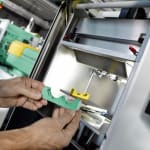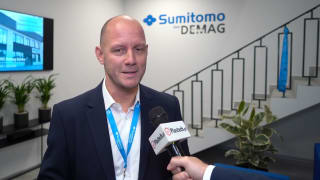 Anyone attending Plastimagen in Mexico City from the 8th to the 11th of March 2016 to gather information on the broad spectrum of manufacture of plastic parts will find that Arburg is the place to go. At exhibition stand 730, two hydraulic Allrounders produce lightweight pedals and precise gearwheels in high volumes. Additionally, a Freeformer demonstrates the industrial additive manufacturing of one-off parts and multi-variant small-volume batches.
Anyone attending Plastimagen in Mexico City from the 8th to the 11th of March 2016 to gather information on the broad spectrum of manufacture of plastic parts will find that Arburg is the place to go. At exhibition stand 730, two hydraulic Allrounders produce lightweight pedals and precise gearwheels in high volumes. Additionally, a Freeformer demonstrates the industrial additive manufacturing of one-off parts and multi-variant small-volume batches."A highlight at Plastimagen 2016 is the fibre direct compounding in which glass fibres are fed in from a roving, cut to the desired length by a cutting device and added directly to the liquid plastic melt. High-strength lightweight components are produced in this manner. Additionally, we will demonstrate the cost-efficient entry in technical injection moulding by presenting a hydraulic Allrounder of the Golden Edition series", explains Guillermo Fasterling, Managing Director of the Arburg subsidiary in Mexico. "Our Freeformer is designed, however, for industrial additive manufacturing of one-off parts and small-volume batches. In Mexico City, we present the current state of Arburg Plastic Freeforming."
Innovative FDC process for high-strength lightweight components
The cost-efficient manufacture of high-strength lightweight components by fibre direct compounding (FDC) is demonstrated by a hydraulic Allrounder 720 S with 3,200 kN clamping force and a size 2100 injection unit producing a pedal for the automotive industry as an example. The advantages of this innovative lightweight construction process are a flexibly adjustable fibre length of up to 50 millimetres, minimal damage to the fibres in the plastic melt as well as less material costs in comparison to long fibre granulates.
Fibres coming from rovings are cut to the lengths of up to 50 millimetres by the side feeder on the injection unit and are then fed directly into the liquid melt. This minimises damage to the fibres during material preparation.
The cycle time for a pedal is about 60 seconds with a part weight of 335 grams. The material used is PA6. A Multilift Select robotic system is used to handle the component.
Golden Edition: hydraulic entry-level model
The second injection moulding exhibit, an Allrounder 320 C Golden Edition featuring a clamping force of 500 kN and a size 170 injection unit, is particularly interesting for technical injection moulding. The machine is a member of the hydraulic entry-level series, which features fixed clamping force/injection unit combinations and offers the high-quality technical components that Arburg is known for at an excellent price/performance ratio. At Plastimagen 2016, gearwheels are produced by an 8-cavity mould of the South-American company Artis Matriz.Freeformer: additive manufacture of functional parts
At Plastimagen 2016, a Freeformer demonstrates the additive manufacturing of functional parts on the basis of 3D CAD data. It process inexpensive, qualified plastic granules and is equipped with two stationary discharge units as standard. This enables the Freeformer to process an additional component in order, for example, to manufacture a part in different colours, with special tactile qualities or as a hard/soft combination. Alternatively, it can be used to build structures from a water-soluble support material, enabling complex part geometries to be realised.On the one hand, the Freeformer can very quickly manufacture prototypes and design samples for functional and assembly tests in the original material. This means that expensive aluminium moulds are not needed and a new product can reach series maturity much faster. On the other hand, it is also possible to manufacture functional components and spare parts at short notice in small batches or – when combined with injection moulding – to individualise mass-produced parts.




